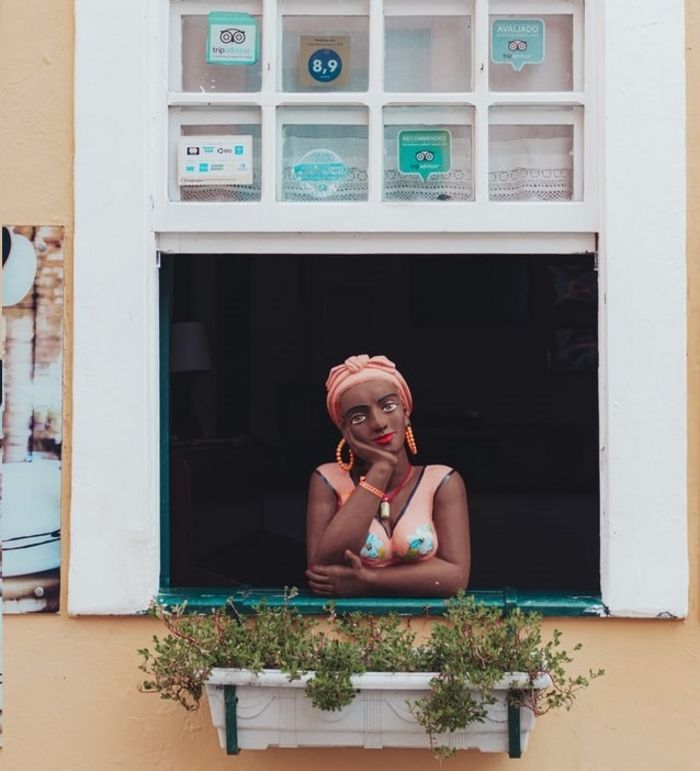Capoeira, Acarajé and Samba - Tourism in Brazil thrives on the cultural heritage of its Afro-Brazilian population. But instead of authentic culture, destinations like the Brazilian state of Bahia stage their streets to fulfill tourists’ expectations. Bahia has become a brand that is marketed with the help of aesthetic and representative elements of Afro-culture in guide books, brochures, social media or travel magazines such as National Geographic. The good thing is, the government now has an incentive to preserve this cultural heritage. At the same time, the consumer product "Afro-culture" reproduces racism and discrimination against the Black population, being presented smiling, singing, dancing or serving in traditional costumes or uniforms.
Exoticisation of a holiday paradise
The Ethno-tourism industry is booming - especially among tourists from Europe and the USA. Many expect exotic destinations where they can immerse themselves in a completely different way of life. But what is real and what has been staged? In the case of Bahia, demonstrating local identities is on top of tourism marketing strategies. But this exoticisation of Afro-Bahian culture has its own "geometry of power". It also reinforces local inequalities and racist stereotypes, knows Alberto Viana, tourism researcher at the University of Salvador de Bahia: "We have not yet overcome our history of more than 400 years of colonial rule. We live in a contradiction where, on the one hand, Afro-Brazilian culture is celebrated in tourism, such as gastronomy or music. But on the other hand, this appreciation is not even enough to get Black people into government, universities and leadership positions. This is also due to the marketing of stereotypes: Afro-Brazilians must always smile, serve and be submissive to white tourists, as they were an attraction." Although 80 per cent of the population in Bahia are considered Afro-Brazilians and their culture is the flagship of Bahia as a tourist destination, this population group benefits too little from tourism, according to Viana: "Due to structural racism, Black people have less access to quality education and entrepreneurial opportunities. Only a small part of the Black population works as tour guides or has their own business. Most Afro-Brazilians work as underpaid and exploited service providers in restaurants, hotels and beach shacks. Some are also street food vendors or work as security guards at parties."
Street food from slave times
What feeds the image of the exotic that Western tourists seeks in particular are the street food stalls of Bahia. Bahia's dancing cooks are an important part of conventional tourism. For many travelers, they are the first locals they notice when they arrive in Bahia's capital Salvador. They can even be bought as souvenir dolls. Nevertheless, the cooks are often held in low esteem by white locals. As descendants of African slaves, they are part of Bahia's post-colonial memories. Their story begins in the 16th century, when enslaved women started selling the traditional food Acarajé to buy their freedom - that is why they are still called the ‘Bahian women with the Acarajé’ (Baianas de Acarajé). Back then, they lured customers to their stalls with their singing. Today, the deep-fried bean cakes are popular street food and the flagship of Bahian cuisine. With their traditional garments, the Baianas stand in large squares, streets and markets and represent Bahia and its African roots. However, Afro-Bahian cuisine is staged as a "spectacle of ethnicity" to attract holidaymakers. But still, it is also an expression of the cultural identity of the local Black population, says Jeferson Bacelar, researcher at the Centre for Afro-Oriental Studies at the University of Bahia: "Afro-Bahian cuisine has become a landmark of the 'Bahia' brand. Yet the food is very special and not something that people in Bahia eat every day. The Afro-Bahians are proud of their culinary culture and celebrate the elaborate production of the dishes. It is really only served on special occasions - and for tourists."
Empowerment of cultural caricatures
Brazil is currently experiencing the worst racist phase of the last 60 years. Not only Afro-hostile politics, but also violence against Black people has massively increased under Bolsonaro's government. Nevertheless, the country can also claim progress. African culture and history have found their way into school curricula and state agencies for the promotion of equality have been established. Also, the work situation in tourism has improved for many Afro-Brazilians, says Viana: "More and more Blacks are working in community-based or Afro-tourism receiving decent wages. One reason for this is new laws that facilitate this type of tourism in several states, thus promoting entrepreneurship among the resident population. But the growing popularity is also a factor. For example, there are initiatives by small travel agencies and Black bloggers. They showcase Afro-Brazilians' inns and hotels on their platforms, pushing their success." There is an opportunity to establish a new image of Black people in Brazilian tourism by strengthening an authentic image of Afro-Brazilian culture and promoting entrepreneurship. An image, that celebrates cultural roots and makes Afro-Brazilians protagonists of their own culture.



![[Translate to english:] Jepp fährt im Sonnenuntergang durch die Savanne](/fileadmin/tourismwatch/_processed_/0/8/csm_hu-chen-0LwfbRtQ-ac-unsplash_357f271485.jpg)